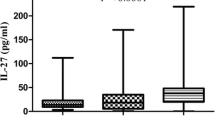Abstract
Background
Bladder cancer (BCa) is the seventh most common cancer among males worldwide. Some reliable markers in blood, urine, and tumor tissue, including clinicopathologic variables, molecular and inflammatory markers, gene polymorphisms, and tumor gene expression profiles are identified for predicting response to BCG immunotherapy in high-risk BCa patients.
Aims
We aimed to determine if FAS and FASL polymorphisms are associated with lack of response to BCG in patients with BCa.
Methods
The study included patients with primary non-muscle invasive BCa that had undergone transurethral resection (TUR). Patient demographics, BCa characteristics, use of BCG immunotherapy, lack of response to BCG (if administered), BCa recurrence, and fatty acid synthetase/fatty acid syntethase ligand (FAS/FASL) polymorphisms were investigated.
Results
The study included 127 patients with primary BCa. Mean age of the 107 (84.3%) male and 20 (15.7%) female patients was 59.3 ± 13.2 years. Among the patients that received BCG immunotherapy, more FAS homozygous patients had BCa recurrence than FAS polymorphism-negative patients (P < 0.001) and more patients with homozygote FASL polymorphisms had BCa recurrence than those with heterozygous FASL polymorphisms and no polymorphism.
Conclusion
Evaluation of FAS/FASL polymorphisms can predict lack of response to BCG immunotherapy and prevent the loss of valuable time before such alternative treatments as early cystectomy are initiated.
Similar content being viewed by others
References
Babjuk M, Bohle A, Burger M et al (2017) EAU guidelines on non-muscle-invasive urothelial carcinoma of the bladder: update 2016. Eur Urol 71(3):447–461. https://doi.org/10.1016/j.eururo.2016.05.041
Alfred Witjes J, Lebret T, Comperat E et al (2017) Updated 2016 EAU guidelines on muscle-invasive and metastatic bladder cancer. Eur Urol 71(3):462–475. https://doi.org/10.1016/j.eururo.2016.06.020
Zlotta A, Fleshner N, Jewett M (2009) The management of BCG failure in non-muscle-invasive bladder cancer: an update. Can Urol Assoc J 3(6 Suppl 4):S199–S205
Zuiverloon T, Nieuweboer A, Vekony H, Kirkels W, Bangma C, Zwarthoff E (2012) Markers predicting response to bacillus Calmette-Guerin immunotherapy in high-risk bladder cancer patients: a systematic review. Eur Urol 61(1):128–145. https://doi.org/10.1016/j.eururo.2011.09.026
Kiselyov A, Bunimovich-Mendrazitsky S, Startsev V (2015) Treatment of non-muscle invasive bladder cancer with bacillus Calmette-Guerin (BCG): biological markers and simulation studies. Bba Clin 4:27–34. https://doi.org/10.1016/j.bbacli.2015.06.002
Lima L, Ferreira J, Tavares A et al (2014) FASL polymorphism is associated with response to bacillus Calmette-Guerin immunotherapy in bladder cancer. Urol Oncol 32(44):E41–E47
Lima L, Oliveira D, Ferreira J et al (2015) The role of functional polymorphisms in immune response genes as biomarkers of bacille Calmette-Guerin (BCG) immunotherapy outcome in bladder cancer: establishment of a predictive profile in a southern Europe population. BJU Int 116(5):753–763. https://doi.org/10.1111/bju.12844
Moudi B, Salimi S, Farajian Mashhadi F, Sandoughi M, Zakeri Z (2013) Association of FAS and FAS ligand genes polymorphism and risk of systemic lupus erythematosus. ScientificWorldJournal 2013:176741
Brandau S, Suttmann H, Riemensberger J, Seitzer U, Arnold J, Durek C, Jocham D, Flad HD, Böhle A (2000) Perforin-mediated lysis of tumor cells by mycobacterium bovis bacillus Calmette-Guerin-activated killer cells. Clin Cancer Res 6(9):3729–3738
Zhang N, Jiang G, Liu X, Na R, Wang X, Xu J (2016) Prediction of bacillus Calmette-Guerin response in patients with bladder cancer after transurethral resection of bladder tumor by using genetic variation based on genomic studies. Biomed Res Int 2016:9859021
Kang H, Tchey D, Yan C et al (2014) The predictive value of Gstt1 polymorphisms in predicting the early response to induction BCG therapy in patients with non-muscle invasive bladder cancer. Urol Oncol 32(4):458–465. https://doi.org/10.1016/j.urolonc.2013.10.013
Ahirwar D, Agrahari A, Mandhani A, Mittal R (2009) Cytokine gene polymorphisms are associated with risk of urinary bladder cancer and recurrence after BCG immunotherapy. Biomarkers 14(4):213–218. https://doi.org/10.1080/13547500902818246
Basturk B, Yavascaoglu I, Oral B, Goral G, Oktay B (2006) Cytokine gene polymorphisms can alter the effect of bacillus Calmette-Guerin (Bcg) immunotherapy. Cytokine 35(1-2):1–5. https://doi.org/10.1016/j.cyto.2006.06.009
Gangwar R, Mandhani A, Mittal R (2010) Xpc gene variants: a risk factor for recurrence of urothelial bladder carcinoma in patients on BCG immunotherapy. J Cancer Res Clin Oncol 136(5):779–786. https://doi.org/10.1007/s00432-009-0717-y
Mittal R, Singh R, Manchanda P et al (2008) Xrcc1 codon 399 mutant allele: a risk factor for recurrence of urothelial bladder carcinoma in patients on BCG immunotherapy. Cancer Biol Ther 7(5):645–650. https://doi.org/10.4161/cbt.7.5.5763
Houston A, O'connell J (2004) The FAS signalling pathway and its role in the pathogenesis of cancer. Curr Opin Pharmacol 4(4):321–326. https://doi.org/10.1016/j.coph.2004.03.008
Reichmann E (2002) The biological role of the FAS/FASL system during tumor formation and progression. Semin Cancer Biol 12(4):309–315. https://doi.org/10.1016/S1044-579X(02)00017-2
Zhang Z, Xue H, Gong W, Wang M, Yuan L, Han S, Zhang Z (2009) FAS promoter polymorphisms and cancer risk: a meta-analysis based on 34 case-control studies. Carcinogenesis 30(3):487–493. https://doi.org/10.1093/carcin/bgp016
Chopin D, Barei-Moniri R, Maille P et al (2003) Human urinary bladder transitional cell carcinomas acquire the functional Fas ligand during tumor progression. Am J Pathol 162(4):1139–1149. https://doi.org/10.1016/S0002-9440(10)63910-7
Li C, Wu W, Liu J, Qian L, Li A, Yang K, Wei Q, Zhou J, Zhang Z (2006 Apr) Functional polymorphisms in the promoter regions of the FAS and FAS ligand genes and risk of bladder cancer in South China: a case-control analysis. Pharmacogenet Genomics 16(4):245–251. https://doi.org/10.1097/01.fpc.0000194425.58511.a7
Verim L, Timirci-Kahraman O, Akbulut H, Akbas A, Ozturk T, Turan S, Yaylim I, Ergen A, Ozturk O, Isbir T (2014 May-Jun) Functional genetic variants in apoptosis associated Fas and Fasl genes and risk of bladder cancer in a Turkish population. In Vivo 28(3):397–402
Author information
Authors and Affiliations
Corresponding author
Ethics declarations
All procedures performed in studies involving human participants were in accordance with the ethical standards of the institutional and/or national research committee and with the 1964 Helsinki declaration and its later amendments or comparable ethical standards.
Conflict of interest
The authors declare that they have no competing interests.
Informed consent
Informed consent was obtained from all individual participants included in the study.
Rights and permissions
About this article
Cite this article
Ceylan, C., Yahşi, S., Doğan, S. et al. Emphasis of FAS/FASL gene polymorphism in patients with non-muscle invasive bladder cancer. Ir J Med Sci 187, 1115–1119 (2018). https://doi.org/10.1007/s11845-018-1764-7
Received:
Accepted:
Published:
Issue Date:
DOI: https://doi.org/10.1007/s11845-018-1764-7




